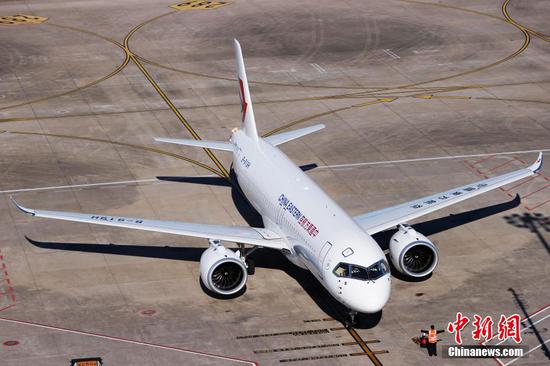Experts advocate new solutions as digital threats turn more sophisticated

Products related to cybersecurity are on display during an expo in Shanghai. (CHINA DAILY)
The increasing integration of artificial intelligence into various sectors has significantly influenced the domain of cybersecurity, and as digital threats become more sophisticated, the traditional approaches to cybersecurity are proving inadequate, thereby necessitating the adoption of AI-enhanced solutions, officials and experts said.
The comments came after the cybersecurity industry in China saw substantial growth, with its market size reaching about 220 billion yuan ($30.8 billion) in 2023 and the number of listed companies in the sector increasing to 28, according to the Ministry of Industry and Information Technology.
Sui Jing, director of the cybersecurity administration of the MIIT, said the integration of AI with security measures will spur the development of new technologies, products and models within the cybersecurity space.
This synergy is expected to lead to the intensive development of high-end and intelligent security products, ultimately enhancing the capability to safeguard against cyber threats, Sui said. The ministry, she said, will increase efforts to encourage companies to develop crucial technologies for AI-enhanced security, especially in areas such as industrial internet and autonomous driving.
Wu Hequan, an academician of the Chinese Academy of Engineering, highlighted the importance of collaborative efforts between AI providers and industries to develop industry-specific AI large language models or LLMs.
LLMs are AI models fed with huge amounts of text data for use in a variety of tasks, ranging from natural language processing to machine translation. It is the key technology underpinning OpenAI's ChatGPT, which has taken the world by storm since late 2022.
Such collaborations can widen access to advanced AI capabilities, particularly for small and medium-sized enterprises, enabling them to effectively implement AI-driven security measures, Wu said.
The integration of AI into cybersecurity is not just a technological advancement but a necessity in the face of evolving cyber threats. As AI continues to redefine content production and consumption, its role in cybersecurity becomes increasingly critical, Wu said.
Zhou Hongyi, founder and chairman of 360 Security Group, emphasized the critical role of AI in addressing the limitations of traditional cybersecurity methods.
AI's superior data processing capabilities and its ability to quickly respond to incidents and trace security breaches are pivotal in managing the vast amounts of data involved in cybersecurity operations, Zhou said.
He underscored the need for AI-driven solutions to stay ahead of malicious actors who are increasingly leveraging AI to develop sophisticated attack tools.
AI-assisted crimes have been rising. For instance, in February, Hong Kong police revealed a fraud case where individuals used AI deepfake technology. The perpetrators impersonated a multinational company's chief financial officer during a video conference, convincing a Hong Kong-based employee to transfer HK$200 million ($30.9 million).The fraud was only uncovered when the employee verified the request with the headquarters.
This incident highlights the dual-edged nature of AI in cybersecurity. While AI can greatly enhance defense mechanisms, it also equips adversaries with powerful tools to execute more convincing and sophisticated attacks. This dichotomy necessitates a robust AI-centric approach to cybersecurity that can both counteract AI-enhanced threats and leverage AI's capabilities to strengthen defenses, experts said.
In response to these challenges, companies like 360 Security Group are heavily investing in the development of AI-driven cybersecurity models. Zhou said the 360 Security Model includes six specialized submodels focusing on various aspects of cybersecurity, such as attack detection, operational management, traceability, knowledge management, data protection, code security and vulnerability analysis.
This comprehensive approach ensures that different facets of cybersecurity are addressed using tailored AI solutions, Zhou said.
Moreover, to make these advanced security models accessible, 360 Security Group has announced that its security model will be available for free to customers purchasing its standard products, with existing customers receiving free upgrades.

















































 京公網安備 11010202009201號
京公網安備 11010202009201號